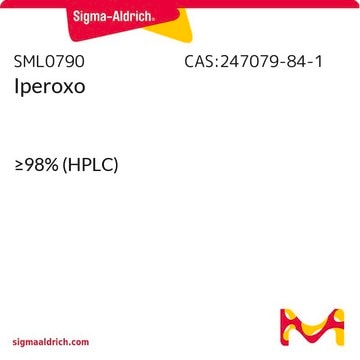Fontos dokumentumok
SML0497
BQCA
≥98% (HPLC)
Szinonimák:
1-(4-methoxybenzyl)-4-oxo-1,4-dihydroquinoline-3-carboxylic acid, Benzyl quinolone carboxylic acid
About This Item
Javasolt termékek
Minőségi szint
Teszt
≥98% (HPLC)
Forma
powder
szín
white to beige
oldhatóság
DMSO: 10 mg/mL (clear solution)
tárolási hőmérséklet
2-8°C
SMILES string
COc1ccc(CN2C=C(C(O)=O)C(=O)c3ccccc23)cc1
InChI
1S/C18H15NO4/c1-23-13-8-6-12(7-9-13)10-19-11-15(18(21)22)17(20)14-4-2-3-5-16(14)19/h2-9,11H,10H2,1H3,(H,21,22)
Nemzetközi kémiai azonosító kulcs
BZBBTGCKPRSPGF-UHFFFAOYSA-N
Biokémiai/fiziológiai hatások
Tulajdonságok és előnyök
Figyelmeztetés
Warning
Figyelmeztető mondatok
Óvintézkedésre vonatkozó mondatok
Veszélyességi osztályok
Acute Tox. 4 Oral
Tárolási osztály kódja
11 - Combustible Solids
WGK
WGK 3
Lobbanási pont (F)
Not applicable
Lobbanási pont (C)
Not applicable
Válasszon a legfrissebb verziók közül:
Analitikai tanúsítványok (COA)
Nem találja a megfelelő verziót?
Ha egy adott verzióra van szüksége, a tétel- vagy cikkszám alapján rákereshet egy adott tanúsítványra.
Már rendelkezik ezzel a termékkel?
Az Ön által nemrégiben megvásárolt termékekre vonatkozó dokumentumokat a Dokumentumtárban találja.
Cikkek
Muscarinic acetylcholine receptors mediate acetylcholine actions in CNS and non-nervous tissues, crucial for cell signaling.
DISCOVER Bioactive Small Molecules for Neuroscience
Tudóscsoportunk valamennyi kutatási területen rendelkezik tapasztalattal, beleértve az élettudományt, az anyagtudományt, a kémiai szintézist, a kromatográfiát, az analitikát és még sok más területet.
Lépjen kapcsolatba a szaktanácsadással









